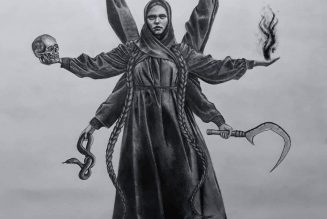ORIGIN
Roman. Messenger god.
KNOWN PERIOD OF WORSHIP
circa 400 BC to circa AD 400.
SYNONYMS
Psychopompus; Oneicopompus;
HERMES
(Greek); Mercury.
CENTER(S) OF CULT
Circus Maximus (Rome).
ART REFERENCES
sculptures and carvings.
LITERARY SOURCES
Aeneid (Virgil), etc.
One of the twelve major deities of Olympus, Mercury is modeled closely on the Greek god Hermes.
In Roman mythology, he is the son of JUPITER and the plains goddess MAIA, born in a cave on Mount Cyllene in Arcadia.
He is attributed with the invention of the lyre made from tortoiseshell, and with various misdemeanors, including the theft of cattle from APOLLO, an allegory on the blowing away of the clouds (Apollo’s herds).
Mercury also personifies the wind.
Apollo presented Mercury with the gift of his winged baton, the caduceus, which had the power of resolving conflict and dispute.
The gods also presented Mercury with winged sandals or talaria and a cap or petasus.
Originally he was a god of riches but became a patron of travelers and thieves.
The French for Wednesday, Mercredi, derives from his name.
His main annual festival, the Mercuralia, took place in Rome in May and his statues were frequently placed as boundary markers.
As Psychopompus he leads the souls of the dead into Hades, and as Oneicopompus he oversees the world of dreams.








